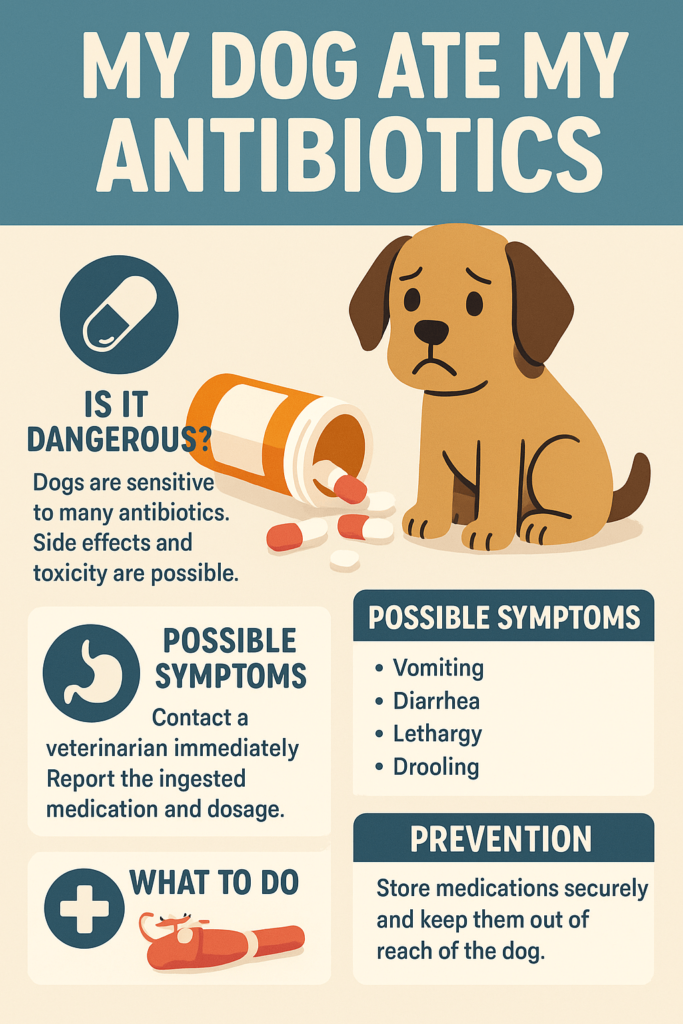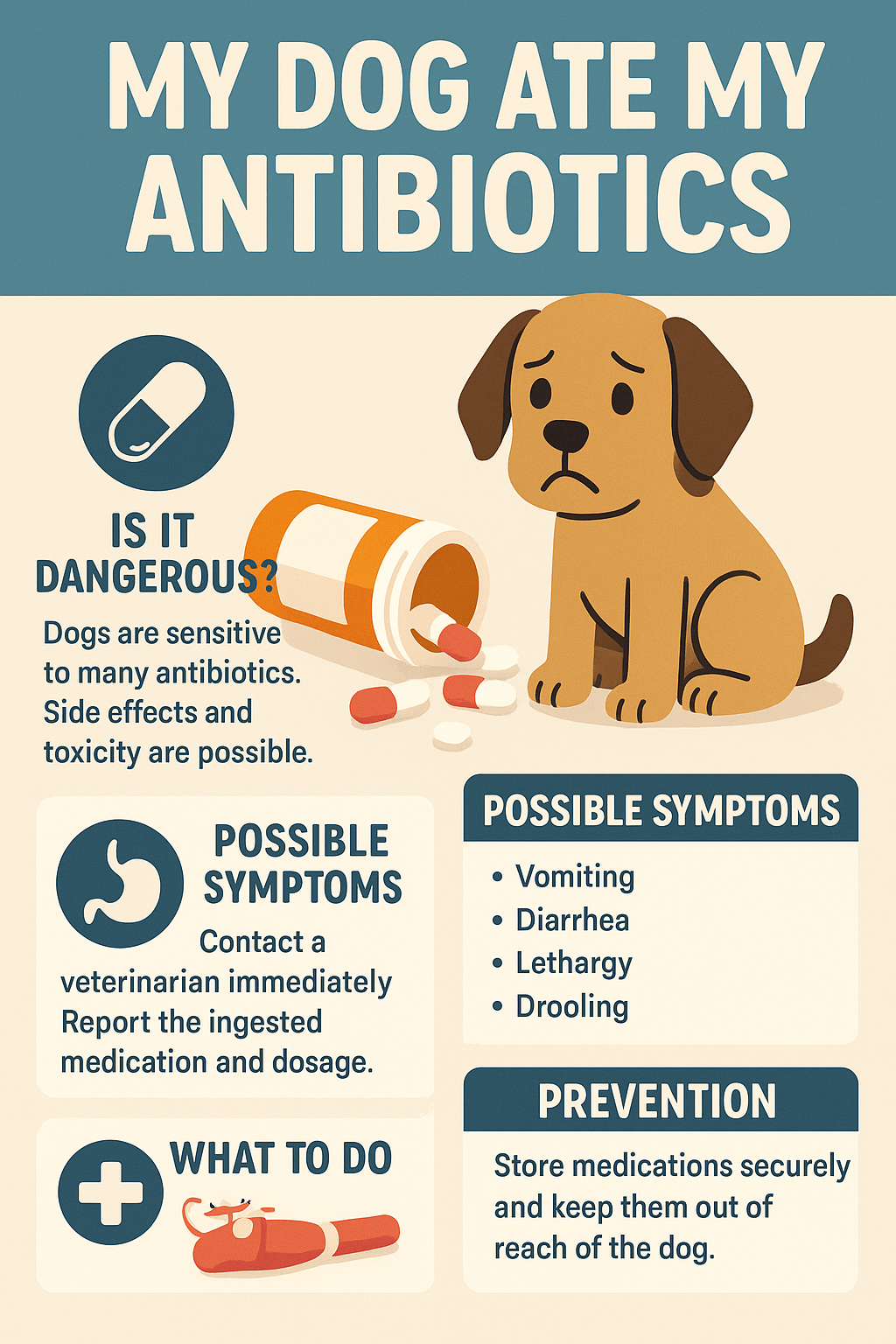My Dog Ate My Antibiotics – What Should I Do?
It’s every pet owner’s nightmare: you turn your back for just a moment, and your curious canine has devoured something they shouldn’t have. If your dog has accidentally ingested your antibiotics, it’s natural to feel panicked. However, staying calm and taking swift action can make all the difference in ensuring their safety. While some medications may not pose an immediate threat, others could lead to serious complications depending on the type and dosage. This blog post will guide you through what to do if your dog ate your antibiotics, how to recognize symptoms of toxicity, and steps to prevent future incidents. Let’s dive into this critical topic to keep your furry friend safe and healthy.
Expert Insight: The Dangers of Human Medications for Dogs
“Certain medications are safe for dogs in the right amounts, but many human medications are highly toxic. Your pet might not have the right enzymes to process the medication and break it down, not to mention that most dogs are much smaller than us.”
Immediate Steps to Take if Your Dog Ate Antibiotics
If you discover that your dog has consumed your antibiotics, acting quickly is essential. Follow these steps to minimize potential harm and ensure your dog receives appropriate care.
Stay Calm and Assess the Situation:
Take a deep breath and gather as much information as possible about the medication, including its name, dosage, and how many pills were ingested.Call Your Veterinarian Immediately:
Contact your vet or an emergency animal clinic right away. Provide them with details about the medication and your dog’s size and breed.Do Not Induce Vomiting Without Guidance:
Attempting to make your dog vomit without professional advice can worsen the situation. Follow your vet’s instructions carefully.Keep the Medication Packaging Handy:
Bring the medication container or label to the vet. This helps them understand the active ingredients and potential risks.Observe Your Dog for Symptoms:
Watch for signs of distress such as vomiting, lethargy, diarrhea, or difficulty breathing, and report them to your vet immediately.
By following these steps, you can ensure your dog receives timely care and reduce the risk of complications from accidental ingestion.

Common Antibiotics and Their Potential Effects on Dogs
Not all antibiotics are created equal, and their effects on dogs can vary significantly. Understanding the risks associated with specific medications can help you communicate effectively with your veterinarian.
Amoxicillin:
Generally considered safe for dogs in appropriate doses, but an overdose can cause gastrointestinal upset or allergic reactions.Tetracycline:
Can lead to nausea, vomiting, or damage to your dog’s kidneys and liver if ingested in large quantities.Ciprofloxacin:
Toxic to dogs and may cause seizures, muscle tremors, or nerve damage even in small amounts.Metronidazole:
Often prescribed for dogs, but excessive doses can result in neurological symptoms like stumbling or rapid eye movements.Clindamycin:
May cause vomiting, diarrhea, or loss of appetite if consumed inappropriately.
Knowing which antibiotics pose greater risks allows you to act more decisively if your dog ingests one of these medications.
Check this guide 👉Can Antibiotics Cause Diarrhea in Dogs? Best 7 Expert Tips!
Check this guide 👉Dog Bite Antibiotics: Best 7 Expert Tips!
Check this guide 👉Antihistamines for Dogs: Best 7 Expert Tips!
Signs of Antibiotic Toxicity in Dogs | Steps to Prevent Future Incidents |
|---|---|
Vomiting or diarrhea | Store medications out of reach |
Lethargy or weakness | Use childproof containers for pills |
Seizures or tremors | Keep medications in a locked cabinet |
Loss of appetite | Supervise your dog during medication times |
Difficulty breathing | Educate family members about pet safety |
How Veterinarians Treat Antibiotic Ingestion in Dogs
When you bring your dog to the vet after they’ve eaten antibiotics, the treatment plan will depend on several factors. Here’s what you can expect during the visit.
Initial Assessment:
The vet will evaluate your dog’s condition, ask questions about the medication, and perform a physical examination.Induced Vomiting (if necessary):
In some cases, the vet may induce vomiting to remove undigested pills from your dog’s stomach safely.Activated Charcoal Administration:
Activated charcoal can bind to toxins in the stomach, preventing further absorption into the bloodstream.IV Fluids and Monitoring:
For severe cases, intravenous fluids may be administered to support kidney function and flush out toxins.Follow-Up Care:
After initial treatment, your vet may recommend additional monitoring or medications to address any lingering effects.
Understanding the treatment process can help you feel more prepared and reassured during this stressful time.
Preventing Accidental Medication Ingestion by Dogs
Prevention is always better than cure when it comes to protecting your dog from harmful substances. These proactive measures can help safeguard your pet.
Store Medications Securely:
Keep all human and pet medications in high, locked cabinets or drawers inaccessible to curious pets.Avoid Leaving Pills Unattended:
Never leave loose pills on countertops, tables, or nightstands where your dog might find them.Use Pill Bottles with Childproof Caps:
Opt for sturdy containers that are difficult for dogs to open, reducing the risk of accidental exposure.Teach “Leave It” Commands:
Training your dog to respond to commands like “leave it” can prevent them from picking up dangerous items.Supervise Closely During Medication Time:
Ensure your dog isn’t nearby when handling medications to avoid accidental drops or spills.
By implementing these precautions, you can significantly reduce the chances of your dog ingesting harmful substances.
Common Household Items That Are Dangerous to Dogs
Beyond antibiotics, many household items pose risks to dogs. Being aware of these dangers helps you create a safer environment for your pet.
Over-the-Counter Pain Relievers:
Medications like ibuprofen or acetaminophen are highly toxic to dogs and can cause severe organ damage.Chocolate and Xylitol:
Both are common food items that can lead to poisoning, resulting in symptoms like vomiting, seizures, or liver failure.Cleaning Products:
Many household cleaners contain chemicals that irritate a dog’s skin, eyes, or digestive system if ingested.Houseplants:
Certain plants, such as lilies or philodendrons, are toxic to dogs and should be kept out of reach.Small Objects:
Items like coins, batteries, or rubber bands can cause choking or intestinal blockages if swallowed.
Awareness of these hazards empowers you to take proactive steps in safeguarding your dog’s environment.
Signs Your Dog Has Eaten Something Toxic
Recognizing the signs of poisoning early can save your dog’s life. Look out for these symptoms if you suspect your dog has ingested something harmful.
Excessive Drooling:
Drooling more than usual can indicate irritation in the mouth or digestive tract caused by toxins.Sudden Vomiting or Diarrhea:
Gastrointestinal upset is a common reaction to ingesting toxic substances.Lethargy or Weakness:
A noticeable drop in energy levels may signal that your dog’s body is struggling to process a toxin.Difficulty Breathing:
Labored or rapid breathing can occur if the substance affects the respiratory system.Seizures or Tremors:
Neurological symptoms often indicate severe poisoning and require immediate attention.
Acting quickly at the first sign of trouble ensures your dog gets the care they need.
How to Create a Pet-Safe Home Environment
Creating a pet-safe home involves identifying and addressing potential hazards. These steps can help you minimize risks and keep your dog out of harm’s way.
Conduct a Home Safety Audit:
Regularly inspect your home for items that could pose a danger to your dog, such as exposed wires or toxic plants.Designate a Safe Space:
Set up a secure area where your dog can stay when unsupervised, free from hazardous objects or substances.Use Bitter Sprays on Unsafe Items:
Apply non-toxic bitter sprays to discourage chewing on inappropriate items like furniture or cords.Install Baby Gates:
Use gates to restrict access to areas where dangerous items are stored, such as kitchens or bathrooms.Educate Family Members:
Make sure everyone in your household understands the importance of keeping medications and other hazards out of reach.
A proactive approach to pet safety ensures a harmonious and worry-free home for both you and your furry friend.
Frequently Asked Questions About Dogs Eating Antibiotics
What should I do first if my dog eats antibiotics?
Stay calm, assess the situation, and contact your veterinarian immediately for guidance.
Can antibiotics harm my dog?
Yes, certain antibiotics can be toxic to dogs, especially in large doses or if they’re not meant for animals.
Will my dog need to go to the vet?
It depends on the type and amount of medication ingested. Your vet will determine the best course of action.
Are there any home remedies for antibiotic ingestion?
No, home remedies can be dangerous. Always seek professional veterinary advice before taking action.
How can I prevent this from happening again?
Store medications securely, supervise your dog closely, and educate household members about pet safety.
Protecting Your Dog from Accidental Medication Ingestion
While discovering that your dog has eaten your antibiotics can be alarming, knowing how to respond can make all the difference. By staying calm, seeking professional help, and understanding the potential risks, you can ensure your furry companion receives the care they need. Additionally, taking preventive measures reduces the likelihood of future incidents, keeping your home safe for your beloved pet. Remember, your quick thinking and responsible actions are key to protecting your dog’s health and well-being.
Do Cats Have Taste Buds? Best 7 Expert Tips! – Discover how cats experience flavors and why their taste is so unique.
Do Dogs Have Taste Buds? Best 7 Expert Tips! – Discover how dogs experience taste, their preferences, and what it means for their diet and health.
Can Cats Taste Sweet? Best 7 Expert Tips! – Discover why cats can’t taste sweetness, how it affects their diet, and tips to keep them healthy and happy.
Can Dogs Taste Sweet? Best 7 Expert Tips! – Discover how dogs perceive sweetness, which foods are safe, and tips to manage their sweet cravings responsibly.





